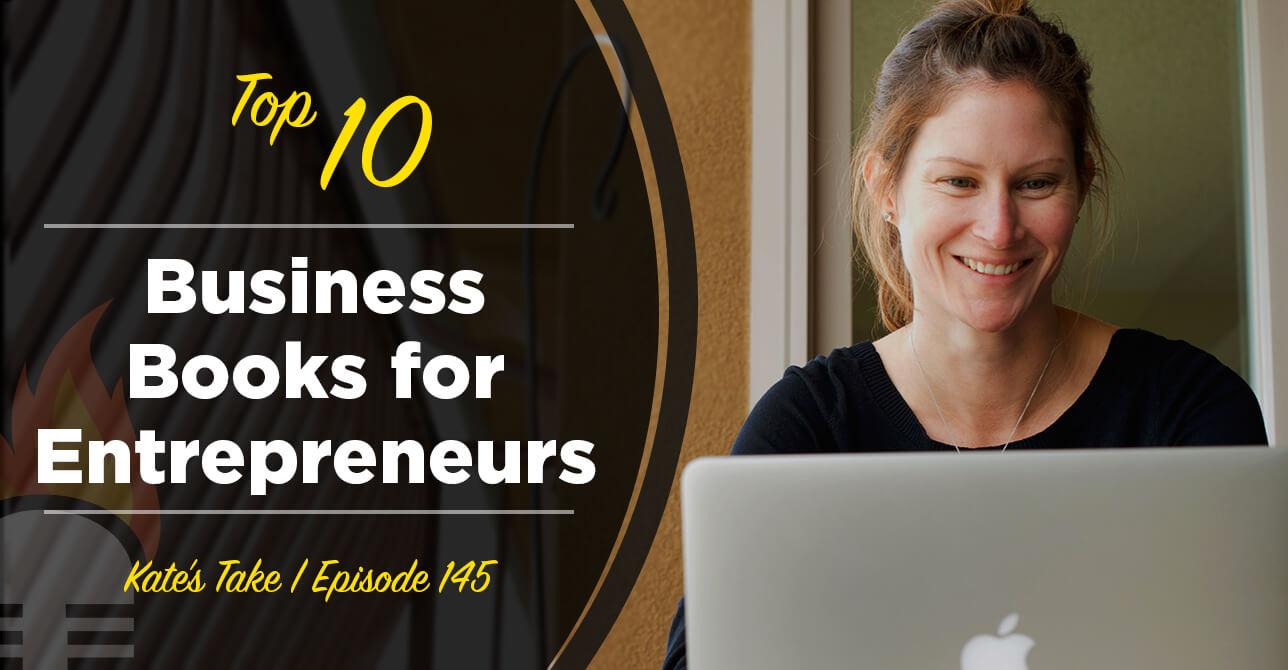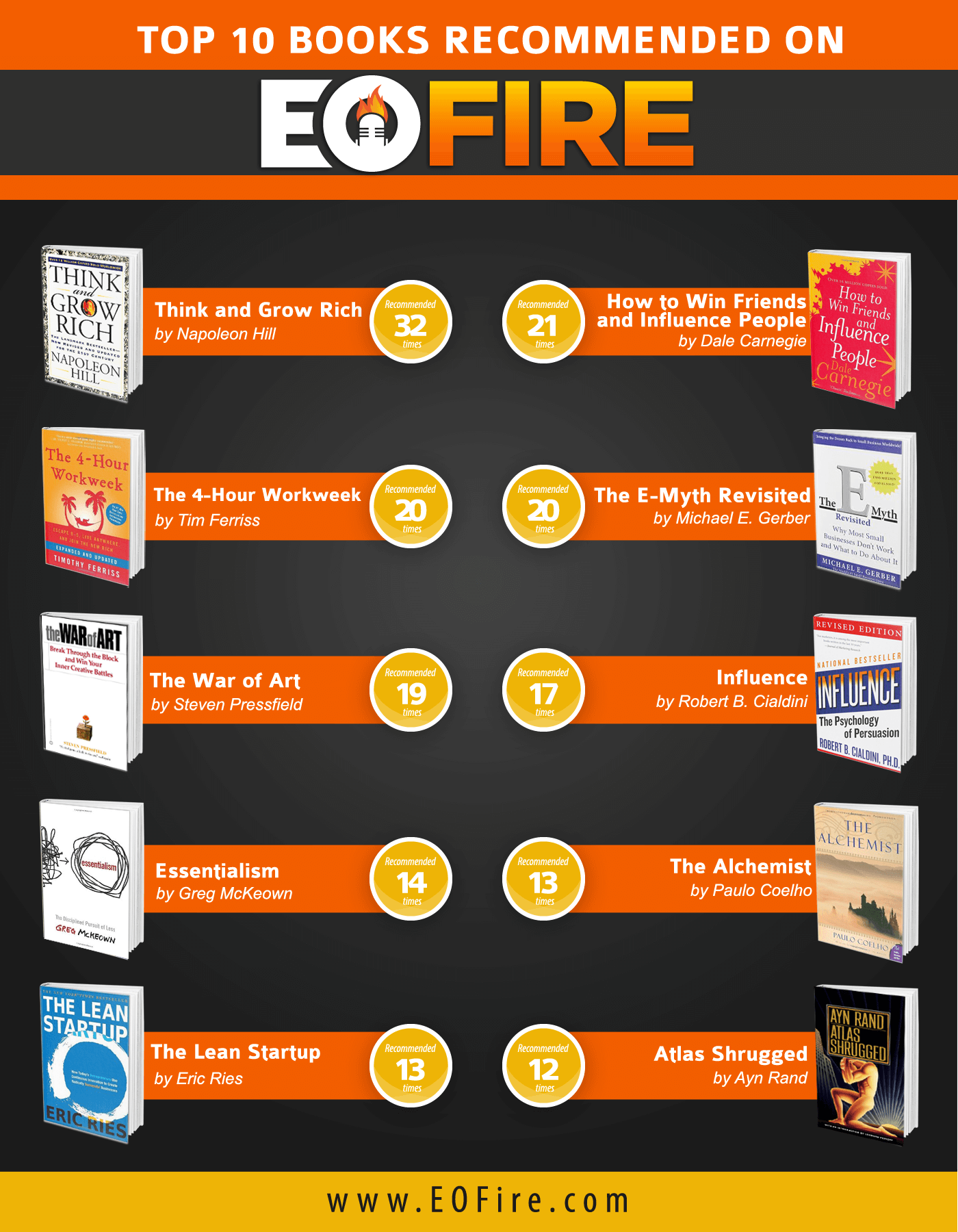 In every single one of the over 1,200 interviews John has recorded for EOFire, he has asked his guest the question: “What’s one business book you’d recommend for Fire Nation?”
In every single one of the over 1,200 interviews John has recorded for EOFire, he has asked his guest the question: “What’s one business book you’d recommend for Fire Nation?”
Top 10 Business Books for Entrepreneurs
There’s a reason why you’ve heard these books recommended a million times: the principles they discuss, the ideas they present, and the mindset they cover are incredibly important to understand if you’re looking to build a successful business and create freedom in your life.
Does that mean you have to agree with everything they teach and ready every single one of them five times over?
No, not at all.
But it does mean they’ve helped millions of people create success in their lives, and that’s the exact reason why you’ve heard them recommend – a million times.
If you’re looking for business book recommendations you haven’t heard of yet, then I have a different post for you to check out right here.
Top 10 Business Books for Entrepreneurs
This Top 10 list comes straight from the over 1,200 interviews John has recorded on EOFire; there is no guessing or estimating about it. And thanks to JM, John’s Virtual Assistant, we have the hard facts: these are the Top 10 Business Books for Entrepreneurs (according to today’s top entrepreneurs!)

What’s changed?
This isn’t the first post we’ve written on top business book recommendations.
In fact, after our first 350 interviews we rounded up the Top 15 Business Books (one of our most popular posts ever thanks to the Tim Ferriss Effect).
In comparing the two lists, there are 3 books on this Top 10 list that didn’t make the Top 15 two years ago.
Those books are:
- The War of Art (Steven Pressfield)
- Essentialism (Greg McKeown)
- Atlas Shrugged (Ayn Rand)
I haven’t read Atlas Shrugged, but I will say The War of Art and Essentialism are two of my personal favorites.
Ok, so now you know what the Top 10 Books for Entrepreneurs are, but how do you know where to start?
Let’s dive in to each of the Top 10 so you can start putting some order to your reading list!
Note: links below are our affiliate links.
Kate’s Take on the Top 10
Wondering which of the Top 10 to dive into first?
I share my take on each below to help you decide – based on where you’re at in your business and life – which you should pick up first.
1. Think and Grow Rich (Napoleon Hill)
Quick look
Since I haven’t read it myself, I can only share what I’ve read about it:
Described on Amazon as “a modern day classic“, Think and Grow Rich shares “ideas which have the power to change your life and set you upon the path of learning and self development.”
You know all those “overnight success” stories you read about?
Those don’t actually exist, because behind every success story is a person like you in many ways – someone who has 24 hours in a day, and who started out on their journey in a position similar to yours.
This book shares “the entire philosophy of moneymaking, just as it was organized from the actual achievements of the most successful men known to the American people during the past fifty years.”
2. How to Win Friends and Influence People (Dale Carnegie)
Quick look
Since I haven’t read it myself, I can only share what I’ve read about it:
Amazon’s description lays out what you can expect from reading this book, including:
- Three fundamental techniques in handling people;
- The six ways to make people like you;
- The twelve ways to win people to you way of thinking;
- The nine ways to change people without arousing resentment.
That’s a lot of things :)
3. The 4-Hour Workweek (Tim Ferriss)
Quick look
It has nothing to do with only working 4 hours per week… it has everything to do with living more and working less.
This book came at a perfect time for me personally. I was on the verge of accepting Corporate America as my future – against my own will of course – and then The 4-Hour Workweek showed me another option.
You can live the exact life you want, and it doesn’t involve building someone else’s dream, or saving every dime possible towards your “retirement”.
Is The 4-Hour Workweek right for you?
Yes.
My favorite quotes
Waiting for a good time to quit your job? The stars will never align and the traffic lights of life will never all be green at the same time… Conditions are never perfect. “Someday” is a disease that will take your dreams to the grave with you.
…do not underestimate the effects of your pessimistic, unambitious, or disorganized friends. If someone isn’t making you stronger, they’re making you weaker.
If you are insecure, guess what? The rest of the world is, too.
Focus on being productive instead of busy.
What we fear doing most is usually what we most need to do.
4. The E-Myth Revisited (Michael E. Gerber)
Quick look
Should someone who loves to bake open a bakery?
This is the overarching question Gerber dissects in The E-Myth Revisited through teaching Sarah (and us) along the way. He uncovers “the myth of the entrepreneur” and shows the huge misunderstanding about who goes into business and why.
The real tragedy is that when the technician falls prey to the Fatal Assumption, the business that was supposed to free him from the limitations of working for somebody else actually enslaves him.
Is The E-Myth Revisited for you?
Ever wonder if entrepreneurship is actually right for you? Do you feel like you understand exactly what goes into creating, growing and running a business?
The Fatal Assumption is this: if you understand the technical work of a business, you understand a business that does that technical work.
Gerber states and dives deep into why this just isn’t true while defining 3 key roles: The Technician, The Manager, and The Entrepreneur.
My favorite quotes
The technician suffering from an Entrepreneurial Seizure takes the work he loves to do and turns it into a job.
The problem is that everybody who goes into business is actually three-people-in-one: The Entrepreneur, The Manager, and The Technician.
The Entrepreneurial Model looks at a business as if it were a product, sitting on a shelf and competing for the customer’s attention against a whole shelf of competing products (or businesses).
5. The War of Art (Steven Pressfield)
Quick look
An amazing read filled with mindset-related value bombs and a strong stance on how we allow resistance to hold us back, Pressfield lays it all on the table:
Resistance’s goal is not to wound or disable. Resistance aims to kill. Its target is the epicenter of our being: our genius, our soul, the unique and priceless gift we were put on earth to give and that no one else has but us. …
Resistance has no strength of its own. Every ounce of juice it possesses comes from us. We feed it with power by our fear of it. Master that fear and we conquer Resistance.
Is The War of Art for you?
If you struggle with fear and discipline – or if you’re wondering “What on earth am I doing?” – then yes. This book is filled with amazing insights and truths about why we feel the way we do, and more importantly, what we can do with Resistance to create positive momentum.
My favorite quotes
There’s a secret that real writers know that wannabe writers don’t, and the secret is this: It’s not the writing part that’s hard. What’s hard is sitting down to write.
Resistance is not a peripheral opponent. Resistance arises from within. It is self-generated and self-perpetuated.
Rule of thumb: The more important a call or action is to our soul’s evolution, the more Resistance we will feel toward pursuing it. …
We can use this as a compass. We can navigate by Resistance, letting it guide us to that calling or action that we must follow before all others.
6. Influence (Robert Cialdini)
Quick look
This book is sectioned off by six categories – Cialdini calls them principles – and each has its own chapter where he discusses their function (how they can benefit you if you use them properly). They are:
- consistency,
- reciprocation,
- social proof,
- authority,
- liking, and
- scarcity
Each of these categories is governed by a fundamental psychological principle that directs human behavior and, in so doing, gives the tactics their power.
Is Influence for you?
Persuasion and learning how to communicate effectively – through your actions, speech, and writing – is integral when creating and growing your business.
Influence defines and gives examples of each of the six principles so you understand how they work and can leverage them.
My favorite quotes
…we, too, have our preprogrammed tapes; and, although they usually work to our advantage, the trigger features that activate them can be used to dupe us into playing them at the wrong times.
A well-known principle of human behavior says that when we ask someone to do us a favor we will be more successful if we provide a reason.
There is a group of people who know very well where the weapons of automatic influence lie and who employ them regularly and expertly to get what they want… The secret of their effectiveness lies in the way they structure their requests, the way they arm themselves with one or another of the weapons of influence that exist within the social environment.
7. Essentialism (Greg McKeown)
Quick look
McKeown is not only a beautiful writer, he also has a beautiful way of communicating things we tend to make incredibly complex in a very easy-to-digest manner.
It’s about learning how to do less but better so you can achieve the highest possible return on every precious moment of your life. …
It will teach you a method for being more efficient, productive, and effective in both personal and professional realms.
Is Essentialism for you?
Feeling overwhelmed and like you’re saying “yes” to way too many things? Wish you had more time, a better handle on your schedule, and an easier feeling about the week ahead?
This is one of the most powerful books I’ve ever read. I think Essentialism should be mandatory for entrepreneurs!
My favorite quotes
…only once you give yourself permission to stop trying to do it all, to stop saying yes to everyone, can you make your highest contribution towards the things that really matter.
Essentialism isn’t about how to get more things done; it’s about how to get the right things done.
We can either make our choices deliberately or allow other people’s agendas to control our lives.
Everything changes when we give ourselves permission to be more selective in what we choose to do.
You can think of this as the 90 Percent Rule, and it’s once you can apply to just about every decision or dilemma. As you evaluate an option, think about the single most important criterion for that decisions, and then simply give the option a score between 0 and 100. If you rate it any lower than 90 percent, then automatically change the rating to 0 and simply reject it.
8. The Alchemist (Paulo Coelho)
Quick look
Since I haven’t read it myself, I can only share what I’ve read about it:
Taken from its description on Amazon, “Coelho’s masterpiece tells the mystical story of Santiago, an Andalusian shepherd boy who yearns to travel in search of a worldly treasure. His quest will lead him to riches far different—and far more satisfying—than he ever imagined. Santiago’s journey teaches us about the essential wisdom of listening to our hearts, of recognizing opportunity and learning to read the omens strewn along life’s path, and, most importantly, to follow our dreams.”
9. The Lean Startup (Eric Ries)
Quick look
I think this sums up the ideas and POV Ries teaches in this book nicely:
“In the Lean Startup model, we are rehabilitating learning with a concept I call validated learning. Validated learning is not after-the-fact rationalization or a good story designed to hide failure. It is a rigorous method for demonstrating progress when one is embedded in the soil of extreme uncertainty in which startups grow. Validated learning is the process of demonstrating empirically that a team has discovered valuable truths about a startup’s present and future business prospects.”
Is The Lean Startup for you?
The Lean Startup discusses fundamental ideas surrounding the importance of learning about who you’re serving; also, how that lends to figuring out what types of products and services you can create for them that they’ll actually pay you money for (without breaking your back – or bank).
My favorite ideas / quotes
Instead of making complex plans that are based on a lot of assumptions, you can make constant adjustments with a steering wheel called the Build-Measure-Learn feedback loop.
Lean thinking defines value as providing benefit to the customer; anything else is waste.
If we’re building something that nobody wants, it doesn’t much matter if we’re doing it on time and on budget.
10. Atlas Shrugged (Ayn Rand)
Quick look
Since I haven’t read it myself, I can only share what I’ve read about it:
Taken from its description on Amazon: “Set in a near-future U.S.A. whose economy is collapsing as a result of the mysterious disappearance of leading innovators and industrialists, this novel presents an astounding panorama of human life” from multiple perspectives.
My Personal Top 7 Entrepreneurial Reads
1. Essentialism (Greg McKeown)
2. Secrets of the Millionaire Mind (T. Harv Eker)
3. Choose Yourself (James Altucher)
4. Dot Com Secrets (Russell Brunson)
5. Virtual Freedom (Chris Ducker)
6. Invisible Selling Machine (Ryan Deiss)
7. The Art of Work (Jeff Goins)
